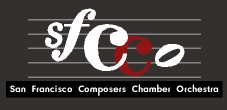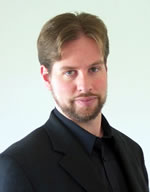SAN FRANCISCO COMPOSERS CHAMBER ORCHESTRA
Presents "Shadows and Hope: Echoes of Democracy and Resilience"
Saturday, November 2, 2024 at 8 pm
Community Music Center
544 Capp Street, San Francisco, CA
|
Ludmila Yurina is a distinguished Ukrainian composer and pianist, born in Uzyn, Ukraine. She graduated from Kyiv Music College as a pianist and earned her composition degree from the Kyiv State P. I. Tchaikovsky Conservatory in 1990, completing her postgraduate studies in 1998. Since 1990, Yurina has been an Associate Professor in the Department of Composition at the National Music Academy of Ukraine, specializing in composition, orchestration, and symphonic score reading. Her education includes workshops with renowned musicians such as Helmuth Lachenmann and Wolfgang Rihm in Dresden. She has also served as a Visiting Scholar at Stanford University's CCRMA in 2011 and 2023/24. Yurina has been a guest composer at prestigious institutions worldwide, including the Rheinsberg Music Academy, Staatliche Hochschule für Musik und Darstellende Kunst in Stuttgart, Texas Christian University, CUNY, and Stanford University. After relocating to Palo Alto, California in 2022, Yurina became an active member of the Bay Area music scene, organizing concerts in San Francisco and Stanford. Her compositions have been performed internationally across Europe, North America, and beyond, collaborating with esteemed ensembles and musicians. Yurina's work is published by leading publishers such as Donemus and Furore Verlag, and she is a member of professional organizations, including NACUSA and ASCAP. She has received numerous awards, including the Lysenko National Award and Fulbright Scholarships, highlighting her significant contributions to contemporary music. |
|
|
Hussein Al-Nasrawi is an accomplished pianist who graduated from San Francisco State University (B.M., 2018, and M.M., 2020), and was born to Iraqi parents. His passion for music is showcased through improvisation, by playing pieces by various composers, and by composing pieces representing people and places. |
|
|
James W. Cook is a summa cum laude graduate of the University of Alabama where he studied composition under Craig P. First. He recently received the First Runner-Up Award in the Nancy Bloomer Deussen Young and Emerging Composer Competition. |
|
|
Douglas Ovens "writes music that has been described by the press as 'theatrical, haunting, and whimsical.' Also active as a percussionist, his music is often rooted in the physicality of percussion playing and experimentation with sound... The New York Times described his piano piece, Moving Image, as 'a work of special appeal...that has an almost conversational shape and pacing, and some wonderful textural detail.'" (from the notes for Old Meets New, Max Lifchitz, piano. North/South Recordings, N/S 1068). Ovens has received commissions from the North/South Chamber Orchestra (NYC), the Lehigh Valley Chamber Orchestra, Allentown and Asheville Symphonies. He has composed music for plays ranging from The Oresteia of Aeschylus to Gao Xingjian's The Other Shore and Alfred Jarry's Ubu Roi, and has been presented in festivals throughout the United States, in Europe, Asia and South America by organizations including Vox Novus, North/South Consonance, NACUSA, and many others. Ovens studied at SFSU and UCSB before moving East to teach at UNC Asheville and Muhlenberg College in Allentown, Pennsylvania and way East at the Accademia dell'Arte in Arezzo, Italy. |
John Beeman studied with Peter Fricker and William Bergsma at the University of Washington where he received his Master's degree. His first opera, The Great American Dinner Table was produced on National Public Radio. Orchestral works have been performed by the Fremont-Newark Philharmonic, Santa Rosa Symphony, and the Peninsula Symphony. The composer's second opera, Law Offices, premiered in San Francisco in 1996 and was performed again in 1998 on the steps of the San Mateo County Courthouse. Concerto for Electric Guitar and Orchestra was premiered in January 2001 by Paul Dresher, electric guitar. Mr. Beeman has attended the Ernest Bloch Composers' Symposium, the Bard Composer-Conductor program, the Oxford Summer Institutes, and the Oregon Bach Festival and has received awards through Meet the Composer, the American Music Center and ASCAP. Compositions have been performed by Ensemble Sorelle, the Mission Chamber Orchestra, the Ives Quartet, Fireworks Ensemble, the Oregon Repertory Singers and Schola Cantorum of San Francisco. |
|
|
The multi-instrumentalist Michael Cooke is a composer of jazz and classical music. This two-time Emmy, ASCAPLUS Award and Louis Armstrong Jazz Award winner plays a variety of instruments: you can hear him on soprano, alto, and tenor saxophones, flute, soprano and bass clarinets, bassoon and percussion. A cum laude graduate with a music degree from the University of North Texas, he had many different areas of study; jazz, ethnomusicology, music history, theory and of course composition. In 1991 Michael began his professional orchestral career performing in many north Texas area symphonies. Michael has played in Europe, Mexico, and all over the United States. Cimarron Music Press began published many of Michael's compositions in 1994. After relocating to the San Francisco Bay Area, he has been exploring new paths in improvised and composed music, mixing a variety of styles and techniques that draw upon the creative energy of a multicultural experience, both in and out of America. In 1999, Michael started a jazz label called Black Hat Records (blackhatrecords.com) and is currently on the Board of Directors of the San Francisco Composers Chamber Orchestra. The San Francisco Beacon describes Michael's music as "flowing out color and tone with a feeling I haven't heard in quite a while. Michael plays with such dimension and flavor that it sets (his) sound apart from the rest." Uncompromising, fiery, complex, passionate, and cathartic is how the All Music Guide labeled Michael's playing on Searching by Cooke Quartet, Statements by Michael Cooke and The Is by CKW Trio. His latest release, An Indefinite Suspension of The Possible, is an unusual mixture of woodwinds, trombone, cello, koto and percussion, creating a distinct synergy in improvised music that has previously been untapped. |
Threnody for Democracy: What You Can Do I. Resilient Nation |
![]() Click on the links to listen to the music.
Click on the links to listen to the music. ![]() Click on the links for video.
Click on the links for video.
| Flute
Oboe Clarinet Alto Sax Bassoon |
Horn Trumpet Trombone Piano Percussion |
Violin I Violin II Viola Cello Bass
|


 John Kendall Bailey is an Associate Conductor with the San Francisco Composers Chamber Orchestra and is Principal Conductor and Chorus Master of the Trinity Lyric Opera, Music Director and Conductor of Voices of Musica Sacra, and Artistic Director of the San Francisco Song Festival. In 1994, Mr. Bailey founded the Berkeley Lyric Opera and served as its Music Director and Conductor until 2001. Since then he has been a guest conductor with the Oakland East Bay Symphony, Oakland Youth Orchestra, and Oakland Ballet, and music director and conductor for productions with North Bay Opera, Mission City Opera, Goat Hall Productions, Solo Opera, the Crowden School and Dominican University. From 2002-2006 he was the Chorus Master of the Festival Opera of Walnut Creek. Mr. Bailey is also a composer, and his works have been performed and commissioned in the Bay Area and abroad.
John Kendall Bailey is an Associate Conductor with the San Francisco Composers Chamber Orchestra and is Principal Conductor and Chorus Master of the Trinity Lyric Opera, Music Director and Conductor of Voices of Musica Sacra, and Artistic Director of the San Francisco Song Festival. In 1994, Mr. Bailey founded the Berkeley Lyric Opera and served as its Music Director and Conductor until 2001. Since then he has been a guest conductor with the Oakland East Bay Symphony, Oakland Youth Orchestra, and Oakland Ballet, and music director and conductor for productions with North Bay Opera, Mission City Opera, Goat Hall Productions, Solo Opera, the Crowden School and Dominican University. From 2002-2006 he was the Chorus Master of the Festival Opera of Walnut Creek. Mr. Bailey is also a composer, and his works have been performed and commissioned in the Bay Area and abroad.